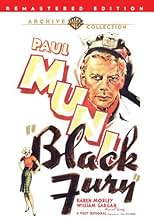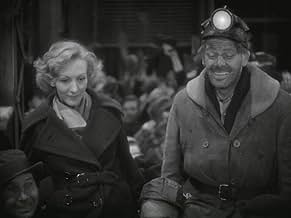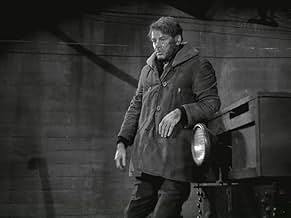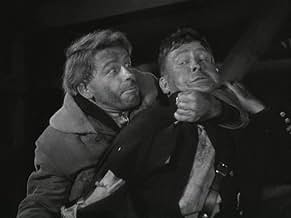IMDb RATING
6.5/10
1.1K
YOUR RATING
An immigrant coal miner finds himself in the middle of a bitter labor dispute between the workers and the mine owners.An immigrant coal miner finds himself in the middle of a bitter labor dispute between the workers and the mine owners.An immigrant coal miner finds himself in the middle of a bitter labor dispute between the workers and the mine owners.
- Nominated for 1 Oscar
- 2 wins & 2 nominations total
John Qualen
- Mike
- (as John T. Qualen)
J. Carrol Naish
- Steve
- (as J. Carroll Naish)
Joseph Crehan
- Farrell
- (as Joe Crehan)
Sara Haden
- Sophie Shemanski
- (as Sarah Haden)
G. Pat Collins
- Lefty - Company Policeman
- (as George Pat Collins)
6.51.1K
1
2
3
4
5
6
7
8
9
10
Featured reviews
10kcfl-1
Best film of year
Let's look at 1935: I don't think there's anyone reviewing now who went to the movies that year, so we have to rely on video. I've seen about 100 films from that year; many have not been preserved. "The Informer"won the Oscar, and a worthy film it was. "A Night at the Opera," "ChinaSeas," "The Good Fairy" "Lives of a Bengal lancer," "Naughty Marietta,"and "The Devil Is a Woman" also came out that year, all great films. "Black Fury" was better than any of them. It's gripping from the first frame to the last. It's as realistically set, and politically sensitive, as any Hollywood film. The closest political thriller I've seen to it is "Massacre" (1934). I loved it for the big factors, like digging itself into an impossible hole, then managing to escape, and Muni's performance. Also for the small ones, like all the supporting performances and the fact that the union happens to be integrated.
Partly watchable but leading performance and poor production values hamper this one.
"Black Fury" was the only time Paul Muni worked with Michael Curtiz. Potentially, this film could have been great but it is far from that. Muni wasn't very keen on acting in films, his preference was always going to be the theatre. He wasn't able to tone down his acting style for the cinema for the most part and he often appeared to be playing a caricature. He is guilty of this in the film "Black Fury." He is too theatrical in his facial expressions, his body language etc. Paul Muni plays a simple but honest coal miner who unwittingly becomes involved in a bitter dispute between the workers and the management. Muni, along with other miners, is subjected to intimidation. Barton MacLane is cast as a villain (he usually was) who is sent to destroy the livelihood of all the coal miners in this small community. Technically, the film is a disappointment. It is all too obvious that the sets representing the town in question are all on a soundstage. The sets don't look real and the direction from Michael Curtiz tends to suffer. The story itself is actually quite good and the film maintains a steady pace. The climax is also effective.
From The Working Class Studio, A Film For The Working Man
During the Thirties Warner Brothers had the reputation of being the working class studio and it was films like Black Fury that made for Warner Brothers that reputation. It was rare indeed to see another studio take stories about ordinary working people. Mostly they concentrated on the middle and upper classes because film was a form of escapism during the Depression. Black Fury coming out as it did in the middle of the New Deal was a timely reminder of the difficulties organized labor faced. Not coincidentally 1935 was the year that the Wagner Labor Relations Act was passed, an effort finally by the government to give labor some kind of equal footing with management. The need of the Wagner Act was to correct some of the abuses shown in films like Black Fury.
Paul Muni plays happy go lucky immigrant coal miner Joe Radek. A man admittedly who works hard and no one thinks of as any kind of brain. He gets used good and proper by the company to stir up the miners so they will strike and give the company an excuse to lock out the union and bring in scabs.
What you see with those miners living on subsistent wages in company towns was taken right from current headlines. It may be ancient history to us now, but it was very real for those people back in the day. The Pinkertons as represented by brutal and corrupt company policeman Barton MacLane had an unsavory reputation as strikebreakers and enforcers for management. That too is no exaggeration.
Muni, aided and abetted by former girl friend Karen Morley now seeing the error of some of her ways, sees what a chump he's been and takes some real direct action against the employers. It's spectacular I'll tell you that.
Though his acting style seems to have not worn well with some, not with me mind you, Muni was given a really rare tribute that year. His performance as Joe Radek was the second time a performer had a sustained write-in campaign for him for an acting Oscar. He finished second in the balloting to Victor McLaglen for The Informer and ahead of Mutiny of the Bounty nominees, Clark Gable, Charles Laughton, and Franchot Tone. The following year the Academy banned write-ins and that's been so ever since. Of course the following year Muni won his Oscar for The Story of Louis Pasteur.
We've moved on in America from an industrial to an information based society and films like Black Fury are now part of history. But it's a history we should not forget.
Paul Muni plays happy go lucky immigrant coal miner Joe Radek. A man admittedly who works hard and no one thinks of as any kind of brain. He gets used good and proper by the company to stir up the miners so they will strike and give the company an excuse to lock out the union and bring in scabs.
What you see with those miners living on subsistent wages in company towns was taken right from current headlines. It may be ancient history to us now, but it was very real for those people back in the day. The Pinkertons as represented by brutal and corrupt company policeman Barton MacLane had an unsavory reputation as strikebreakers and enforcers for management. That too is no exaggeration.
Muni, aided and abetted by former girl friend Karen Morley now seeing the error of some of her ways, sees what a chump he's been and takes some real direct action against the employers. It's spectacular I'll tell you that.
Though his acting style seems to have not worn well with some, not with me mind you, Muni was given a really rare tribute that year. His performance as Joe Radek was the second time a performer had a sustained write-in campaign for him for an acting Oscar. He finished second in the balloting to Victor McLaglen for The Informer and ahead of Mutiny of the Bounty nominees, Clark Gable, Charles Laughton, and Franchot Tone. The following year the Academy banned write-ins and that's been so ever since. Of course the following year Muni won his Oscar for The Story of Louis Pasteur.
We've moved on in America from an industrial to an information based society and films like Black Fury are now part of history. But it's a history we should not forget.
How Green Was My Screenplay
Paul Muni, David Thomson once wrote, was the '30s' idea of a great actor: He never looked the same twice. Here he's a hail-fellow-well-met Eastern European immigrant coal miner in a dreary Pennsylvania burg, deceived by union busters and weighed down by a ten-ton accent. Indeed the screenplay seldom rises above a fifth-grade literacy level, the better to illustrate the goodheartedness of these poor but honest laborers. But five minutes of Muni, and you've seen the whole performance -- a Zorba-the-miner "life force" who yells all his lines and sounds unfortunately like Steve Martin's wild-and-crazy-guy character from Saturday Night Live in the '70s.
Warners does come up with a convincingly grimy set and a capable stock-company supporting cast, but the dramaturgy is connect-the-dots. One miner shouts and sways the whole crowd, then another, then another -- what a gullible bunch this must be. The evil cops and management figures are so absurdly evil that nuance is lost. The third act does whip up to an exciting blow-up-the-mine climax, but then it's resolved in headline montages, as if Warners suddenly ran out of money, or film. And Michael Curtiz -- I didn't think this fine director was capable of this -- stages the crowd scenes clumsily, shifting point of view confusingly and slapping the mise-en-scene together hard, with loud music. Certainly the studio is on the side of the angels, arguing for a fair day's pay for a fair day's work, and as a '30s sociological curio the movie is not without interest. But Muni's monotonous bluster and an elementary script combine to create a cinematic cave-in.
Warners does come up with a convincingly grimy set and a capable stock-company supporting cast, but the dramaturgy is connect-the-dots. One miner shouts and sways the whole crowd, then another, then another -- what a gullible bunch this must be. The evil cops and management figures are so absurdly evil that nuance is lost. The third act does whip up to an exciting blow-up-the-mine climax, but then it's resolved in headline montages, as if Warners suddenly ran out of money, or film. And Michael Curtiz -- I didn't think this fine director was capable of this -- stages the crowd scenes clumsily, shifting point of view confusingly and slapping the mise-en-scene together hard, with loud music. Certainly the studio is on the side of the angels, arguing for a fair day's pay for a fair day's work, and as a '30s sociological curio the movie is not without interest. But Muni's monotonous bluster and an elementary script combine to create a cinematic cave-in.
A Closer Look at the Political Subtext
Dynamic social conscience movie from the 1930's studio of record, Warner Bros.-- MGM may have had the glitz, but Warners had the heart. The film is no unmixed triumph. Muni over- acts, at times outrageously, yet most importantly there's no effort at prettifying the lives of the miners. The company shacks the miners must rent are unrelievedly dingy; the streets, narrow and drab; the women, unadorned in cheap house dresses. The only polish or comfort comes from company offices, but that too is understated. The underground sets look authentic-- closed-in, dirty and dangerous. No wonder the company keeps battalions of "cops" on hand. This "company town" is more like a penal colony than a work site, and I'm reminded of the old Tennessee Ernie Ford song "Sixteen Tons". Anyone thinking these conditions exaggerate should Google "Ludlow massacre" or "United Mine Workers of America" for historical insight.
The screenplay does a good job of weaving personal stories into the larger social context. At the same time, there are several topical points to note. First, there's a union-management agreement in place at the movie's outset. Neither side is fully happy, but work is proceeding (notice miners aren't paid for work not directly that of extracting coal!). Trouble is that strike-breaking companies like the one Croner (Naish) works for aren't making money during periods of labor calm. So, through Croner, they exploit lingering grievances to break the agreement, and make money. The screenplay casts them as the real villains, and not the union nor the company. Thus, the studio plays it safe by refusing to take sides between labor and management. And if miners are still unhappy, the script suggests conditions will continue to improve with the union behind them. Then too, once the various conflicts ( miners vs. strike-breakers; Radek {Muni}vs. Mc Gee {MacLane}) culminate, a federal government, depicted as justice-seeking, steps in to punish wrong-doers and guarantee the new agreement.
Thus, the government in Washington is cast in a non-partisan and positive light. At the same time, union and management are shown as able to reconcile their differences as long as there's no outside agitation. Now, this is in practical alignment with actual New Deal policy towards emergent industrial unions and newly installed federal bargaining rules (National Labor Relations Act). On the other hand, had the script wanted, Croner could have come from the political Left (Communist or socialist) instead of the political Right (strike- breakers). In historical fact, Roosevelt had to confront militant forces from both Left and Right in forging what became a Centrist labor policy that continued for decades. At the same time, the movie reflects much of that approach. Indeed, Warner Bros. was the New Deal's best friend in Hollywood as its many topical films from that period testify.
The movie does a good job of motivating the characters. The popular Radek becomes a vulnerable fall-guy for Croner once Anna (Morley) jilts him. Revealingly, both he and Anna are motivated by desires to escape the grueling life of the mines. Farm life may, in turn, be as burdensome, but at least you're your own boss. The very real problem of alcoholism is also hinted at in several scenes, it being the one escape open to the men. Note, however, that the screenplay remains vague on the demands of the break-away union faction, perhaps to keep the audience from taking sides over the strike. Something should also be said about that fine actress Karen Morley, a real-life labor activist in the actor's union. Her angular features bordered on prettiness, but were especially effective in registering icy determination, as a number of 30's films testify (e.g. Our Daily Bread, (1934).
Despite its many dated elements, the movie should not be looked at as a dead artifact. True, many of the awful work and living conditions depicted in the movie have since been overcome, thanks to labor's right to organize and bargain. Nonetheless, in our own time, many industrial jobs have been exported to low-wage countries, while coal as an energy source has been de-emphasized. Nonetheless, the basic conflicts between labor and management remain, whether blue-collar or white-collar, while government's role remains key. And in a sagging economy rife with unemployment and stagnant wages, old movies like Black Fury continue to resonate.
The screenplay does a good job of weaving personal stories into the larger social context. At the same time, there are several topical points to note. First, there's a union-management agreement in place at the movie's outset. Neither side is fully happy, but work is proceeding (notice miners aren't paid for work not directly that of extracting coal!). Trouble is that strike-breaking companies like the one Croner (Naish) works for aren't making money during periods of labor calm. So, through Croner, they exploit lingering grievances to break the agreement, and make money. The screenplay casts them as the real villains, and not the union nor the company. Thus, the studio plays it safe by refusing to take sides between labor and management. And if miners are still unhappy, the script suggests conditions will continue to improve with the union behind them. Then too, once the various conflicts ( miners vs. strike-breakers; Radek {Muni}vs. Mc Gee {MacLane}) culminate, a federal government, depicted as justice-seeking, steps in to punish wrong-doers and guarantee the new agreement.
Thus, the government in Washington is cast in a non-partisan and positive light. At the same time, union and management are shown as able to reconcile their differences as long as there's no outside agitation. Now, this is in practical alignment with actual New Deal policy towards emergent industrial unions and newly installed federal bargaining rules (National Labor Relations Act). On the other hand, had the script wanted, Croner could have come from the political Left (Communist or socialist) instead of the political Right (strike- breakers). In historical fact, Roosevelt had to confront militant forces from both Left and Right in forging what became a Centrist labor policy that continued for decades. At the same time, the movie reflects much of that approach. Indeed, Warner Bros. was the New Deal's best friend in Hollywood as its many topical films from that period testify.
The movie does a good job of motivating the characters. The popular Radek becomes a vulnerable fall-guy for Croner once Anna (Morley) jilts him. Revealingly, both he and Anna are motivated by desires to escape the grueling life of the mines. Farm life may, in turn, be as burdensome, but at least you're your own boss. The very real problem of alcoholism is also hinted at in several scenes, it being the one escape open to the men. Note, however, that the screenplay remains vague on the demands of the break-away union faction, perhaps to keep the audience from taking sides over the strike. Something should also be said about that fine actress Karen Morley, a real-life labor activist in the actor's union. Her angular features bordered on prettiness, but were especially effective in registering icy determination, as a number of 30's films testify (e.g. Our Daily Bread, (1934).
Despite its many dated elements, the movie should not be looked at as a dead artifact. True, many of the awful work and living conditions depicted in the movie have since been overcome, thanks to labor's right to organize and bargain. Nonetheless, in our own time, many industrial jobs have been exported to low-wage countries, while coal as an energy source has been de-emphasized. Nonetheless, the basic conflicts between labor and management remain, whether blue-collar or white-collar, while government's role remains key. And in a sagging economy rife with unemployment and stagnant wages, old movies like Black Fury continue to resonate.
Did you know
- TriviaThough it received no official Oscar nominations, the Academy permitted write-in candidates this year and when the voting order was announced it turned out that Paul Muni had come in second in the balloting, narrowly behind winner Victor McLaglen but ahead of any of the other nominated actors.
- GoofsAt c. 24 minutes Joe is counting out his money, but he is inconceivably inaccurate. After counting to 68 dollars he places two further bills on the table and counts "73" out loud. A few moments later he counts up to 75 dollars, but, after four more bills have been placed in front of him he announces "76" dollars as his total.
- ConnectionsFeatured in Hollywood and the Stars: The Angry Screen (1964)
- SoundtracksWhy Do I Dream Those Dreams?
(1934) (uncredited)
Music by Harry Warren
Played on piano in bar during scene where men challenge Radek
Details
- Release date
- Country of origin
- Language
- Also known as
- Black Hell
- Filming locations
- Warner Ranch, Calabasas, California, USA(mine shaft scenes)
- Production company
- See more company credits at IMDbPro
- Runtime
- 1h 34m(94 min)
- Color
- Sound mix
- Aspect ratio
- 1.37 : 1
Contribute to this page
Suggest an edit or add missing content








































